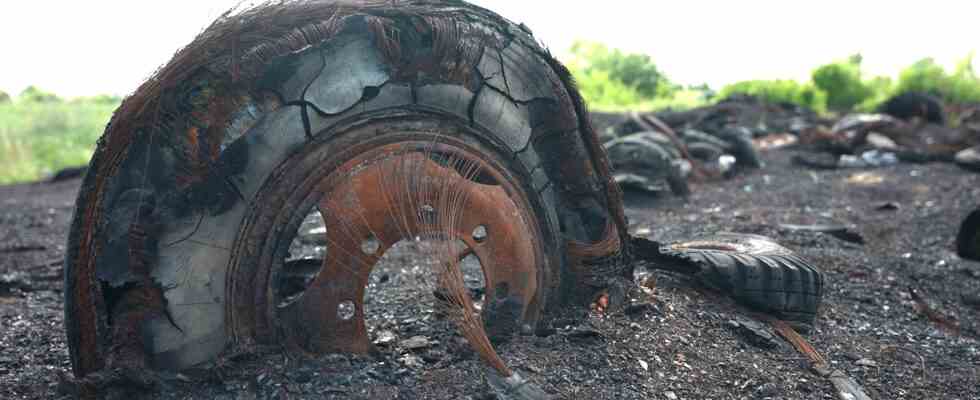Exclusive
Status: 09.08.2022 5:12 p.m
The illegal storage of used car tires is becoming an increasing problem, research by the SWR. Neither manufacturers nor politicians are providing any solutions in the foreseeable future. There are suggestions and role models in the EU.
Around 700,000 tons of old tires accumulate in Germany every year. Their professional recycling is expensive and complicated. For a long time, large quantities of used tires were burned in cement works to generate energy. But the cement industry is switching to plastic waste. The use of granulated used tires in products such as artificial turf, running tracks or gym mats is also becoming more difficult because the legal requirements are becoming ever stricter.
In addition, the tires that are driven in this country are becoming less and less suitable for rims in African countries. German tires are just too wide, exports are stagnating. In turn, cheap “Chinese tires” are driving retreaded old tires off the market because new ones are cheaper than recycled ones. And Seal tires, which are considered “unflatable” by glue, can no longer be recycled either.
The increasing disposal pressure and high costs make old tires a coveted commodity for criminal cheap disposal companies. They offer simple solutions at prices that make clean and legal disposal impossible.
Illegal disposal is increasing
Christina Guth has been observing the illegal disposal of used tires for many years. She heads the ZARE initiative – certified scrap tire disposal companies. It is an association of companies that are organized in the Federal Association of Tire Retailers and Vulcanisers. Guth and her staff document the extent of illegal tire dumping and have covered hundreds of locations nationwide based on reports and newspaper articles. “What we have found is that illegal disposal is increasing,” says Guth. In 2021 alone, 195 cases were counted nationwide, 31 more than in the previous year.
ZARE has been counting cases of illegal tire disposal throughout Germany since 2016. The numbers have increased every year. An increase is particularly noticeable with orders of 50 to 100 tires. However, since these are only reported cases, the number of unreported cases is probably significantly higher.
Illegal waste dump in Berlin
How easy it is to act as a tire dealer and conclude questionable disposal deals is covered by the journalists in the new format full screen with an undercover investigation. For weeks they were in contact with dubious disposal companies. For a disposal fee, they handed over a cargo of tires equipped with a tracking device to an entrepreneur, against whom the public prosecutor’s office is already investigating on suspicion of illegal waste disposal, and filmed with a hidden camera.
The old tires started moving the day after. Eventually, they ended up in an illegal waste dump in Berlin. The responsible environmental and control authorities now want to have the affected area cleared. But the tires are still there today – without proper disposal.
Toxins get into the environment
The problem with the mountains of illegal tires: toxins can easily get into the environment. Fires also break out from time to time. Samples taken by the journalists from a burned-down tire warehouse not far from Leipzig show that the leftover tires are hazardous waste and belong in a special landfill. In many cases, however, those responsible for illegal dumping are not held accountable. Either they cannot be found or they are destitute. Municipalities or the federal states therefore often have to take care of disposal, financed with taxpayers’ money. In some cases, damage has been caused in the millions.
In search of solutions to the tire problem, the journalists in Cologne at Europe’s largest tire fair “The Tire Cologne” confronted the manufacturers with their promises of sustainability. Tire companies such as Continental or Michelin advertise with sustainability and environmental awareness. So far, however, they apparently want little to do with the environmental problem caused by their tires at the end of their life cycle. “It’s not a problem that’s important to me as an industry,” says a spokesman for Continental in an interview. Others dodge the journalists’ questions. Even after written inquiries, it remains unclear whether and how the manufacturers want to take concrete responsibility for illegally dumped used tires and their disposal.
solution in a few years
Politicians have not yet been able to come up with a solution to make corporations more responsible. One possible approach would be a fund in which manufacturers pay a fee for each tonne of tires, as is the case with the Green Dot, with which professional disposal is financed. A study commissioned by the Federal Environment Agency comes to the conclusion that such a fund solution would make sense.
When asked, the press office of the higher-level Federal Environment Ministry replied that the results of the research project were being evaluated and, if necessary, appropriate measures would be derived from them. But: “It can be assumed that the implementation in a legal framework will take a few more years.”
In other European countries such as Sweden, Belgium and the Netherlands, things are already further along. There, the manufacturers have to pay license fees for the disposal of used tires. Disposal companies also have to prove the reuse and recycling of old tires with certificates of recycling – unlike in Germany, where disposal companies only need a trade license to earn money from old tyres. Christina Guth from ZARE is also calling for the certification of used tire dealers to be mandatory in order to stop illegal disposal. “Then questionable dealers would be out of the industry,” she says.
Collaboration: Cem Bozdogan
The video contribution “Illegal deals – how the tire mafia poisons nature” is available at www.youtube.de/vollbild and in the ARD media library.

